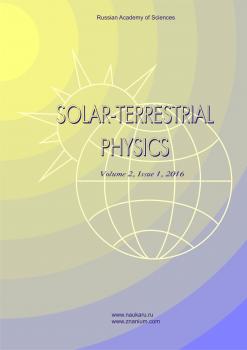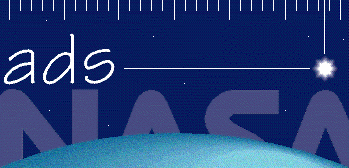Уссурийск, Россия
Using data with hourly resolution obtained in near-Earth heliosphere in 1965–2014, we have calculated statistical characteristics of the angles describing the direction of the interplanetary magnetic field (IMF): root-mean-square deviations of azimuthal and elevation angles, asymmetries of their distributions, and coefficient of correlation of the angles. It has been shown that the above characteristics varied in the course of solar cycle, and some of them changed their signs when solar polar magnetic field reversed. The results obtained from the experimental data analysis were compared with a model describing transport of large-scale disturbances of IMF lines by the inhomogeneous solar wind. The comparison has shown that the variations in the angular distribution of IMF in the course of solar cycle probably occur due to the appearance of the large-scale latitudinal gradient of solar wind velocity during solar minima. In addition, the angular distribution of IMF has been found to be substantially affected by the longitudinal velocity gradient in trailing parts of high-speed streams and short-term local-scale variations in velocity gradients.
interplanetary magnetic field, solar wind, solar cycle
1. Borovsky J.E. On the variations of the solar wind magnetic field about the Parker spiral direction. J. Geophys. Res. 2010, vol. 115, A09101. DOI:https://doi.org/10.1029/2009JA015040.
2. Bruno R., Carbone V. The solar wind as a turbulence laboratory. Living Rev. Solar Phys. 2005, vol. 2, pp. 1-186. https://link.springer.com/article/10.12942/lrsp-2005-4.
3. Burlaga L.F., Ness R.F. Global patterns of heliospheric magnetic field polarities and elevation angles: 1990 through 1995. J. Geophys. Res. 1997, vol. 102, no. A9, pp. 19,731-19,742. DOI:https://doi.org/10.1029/97JA01568.
4. Crooker N.U., Lazarus A.J., Phillips J.L., Steinberg J.T., Szabo A., Lepping R.P., Smith E.J. Coronal streamer belt asymmetries and seasonal solar wind variations deduced from Wind and Ulysses data. J. Geophys. Res. 1997, vol. 102, no A3, pp. 4673-4679. DOI:https://doi.org/10.1029/96JA03681.
5. Erofeev D.V. Variation in the statistical properties of IMF direction fluctuations during the 22-year solar magnetic cycle. Geomagnetism and Aeronomy. 2014, vol. 54, no. 8, pp. 1032-1038. DOI: 10.1134/ S0016793217070064.
6. Erofeev D.V. Model of transport of large-scale magnetic field fluctuations in the solar wind. Geomagnetism and Aeronomy. 2017, vol. 57, no. 7, pp. 864-868. DOI: 10.1134/ S0016793217070064.
7. Forsyth R.J., Balogh A., Smith E.J., Erdos G., McComas D.J. The underlying Parker spiral structure in the Ulysses magnetic field observations, 1990-1994. J. Geophys. Res. 1996, vol. 101, no. A1, pp. 395-403.
8. Giacalone J. The latitudinal transport of energetic particles associated with corotating interaction regions. J. Geophys. Res. 2001, vol. 106, no. A8, pp. 15,881-15,887.
9. Giacalone J., Jokipii J.R. Magnetic footpoints diffusion at the Sun and its relation to the heliospheric magnetic field. Astrophys. J. 2004, vol. 616, pp. 573-577. DOI: 10.1086/ 424870.
10. Goldstein B.E., Neugebauer M., Phillips J.L., Bame S., Gosling J.T., McComas D., Wang Y.-M., Sheeley N.R., Suess S.T. Ulysses plasma parameters: latitudinal, radial, and temporal variations. Astron. Astrophys. 1996, vol. 316, pp. 296-303.
11. Kojima M., Tokumaru M., Watanabe H., Yokobe A. Heliospheric tomography using interplanetary scintillation observations 2. Latitude and heliocentric distance dependence of solar wind structure at 0.1-1 AU. J. Geophys. Res. 1998, vol. 103, no. A2, pp. 1981-1989. DOI:https://doi.org/10.1029/97JA02162.
12. Kovalenko V.A. Solnechniy veter [Solar Wind]. Moscow, Nauka Publ., 1983. 272 p. (In Russian).
13. Lyatsky W., Tan A., Lyatskaya S. Effect of the Sun’s magnetic field polarity on interplanetary magnetic field Bz. Geophys. Res. Lett. 2003, vol. 30. L2258. DOI:https://doi.org/10.1029/2003GL017431.
14. Mardia K.V. Statistics of directional data. London & New York, Academic Press. 1972, 380 p.
15. McComas D.J., Barraclough B.L., Funsten H.O., Gosling J.T., Santiago-Munoz E., Skoug R.M., Goldstein B.E., Neugebauer M., Riley P., Balogh A. Solar wind observations over Ulysses’ first full polar orbit. J. Geophys. Res. 2000, vol. 105, no. A5, pp. 10,419-10,433. DOI:https://doi.org/10.1029/1999JA000383.
16. Schwadron N.A., McComas D.J. The sub-Parker spiral structure of the heliospheric magnetic field. Geophys. Res. Lett. 2005, vol. 32, L03112. DOI:https://doi.org/10.1029/2004GL021579.
17. Smith E.J. The global heliospheric magnetic field. The Heliosphere through the Solar Activity Cycle. Springer, 2008, pp. 79-150.
18. Tu C.-Y., Marsch E. A Model of solar wind fluctuations with two components: Alfvén waves and convective structures. J. Geophys. Res. 1993, vol. 98, no. A2, pp. 1257-1276.
19. Ulrich K., Tran T. Generation of a North/South magnetic field component from variations in the photospheric magnetic field. Solar Phys. 2016, vol. 291, pp. 1059-1076. DOI:https://doi.org/10.1007/s11207-016-0882-5.
20. Veselovsky I.S., Tarsina M.V. Angular distribution of interplanetary magnetic field vector. Geomagnetizm i aeronomiya [Geomagnetism and Aeronomy]. 2001, vol. 41, no. 4, pp. 471-476. (In Russian).
21. Veselovsky I.S., Shugay Yu.S. High-speed flows of solar wind near the Earth’s orbit and their sources on the Sun from stereoscopic observations during minimum of cycle 23. Kosmicheskiye issledovaniya [Cosmic Res.]. 2010, vol. 48, no. 1, pp. 33-42. (In Russian).
22. Xu F., Li G., Zhao L., Zhang Y., Khabarova O., Miao B., le Roux J. Angular distribution of solar wind magnetic field vector at 1 AU. Astrophys. J. 2015, vol. 801, iss. 1, article id. 58, 7 p. DOI:https://doi.org/10.1088/0004-637X/801/1/58.
23. Zieger B., Mursula K. Annual variation in near-Earth solar wind speed: Evidence for persistent north-south asymmetry related to solar magnetic polarity. Geophys. Res. Lett. 1998, vol. 25, no. 6, pp. 841-844.
24. URL: ftp://nssdcftp/gsfc.nasa.gov/spacecraft_data (accessed October 11, 2018).

















